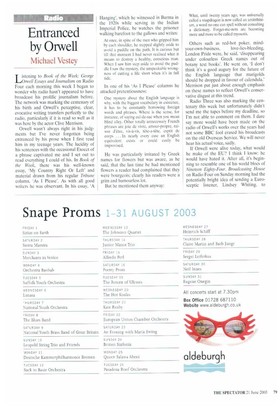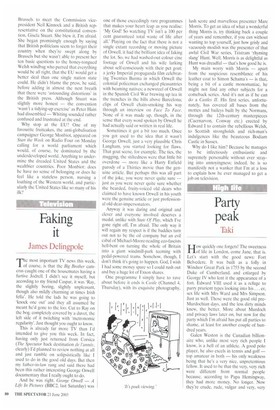Entranced by Orwell
Michael Vestey
Utening to Book of the Week: George rwell Essays and Journalism on Radio Four each morning this week I began to wonder why radio hasn't appeared to have broadcast his prolific journalism before. The network was marking the centenary of his birth and Orwell's perceptive, clear, evocative writing transfers perfectly to the radio, particularly if it is read so well as it was here by the actor Clive Merrison.
Orwell wasn't always right in his judgments but I've never forgotten being entranced by his prose when I first read him in my teenage years. The lucidity of his sentences with the occasional Exocet of a phrase captivated me and I set out to read everything I could of his. In Book of the Week, there was his well-known essay, 'My Country Right Or Left' and material drawn from his regular Tribune column, As I Please'. As with all good writers he was observant. In his essay, 'A Hanging', which he witnessed in Burma in the 1920s while serving in the Indian Imperial Police, he watches the prisoner walking barefoot to the gallows and writes:
At once, in spite of the men who gripped him by each shoulder, he stepped slightly aside to avoid a puddle on the path. It is curious but till that moment I had never realised what it means to destroy a healthy, conscious man. When I saw him step aside to avoid the puddle I saw the mystery, the unspeakable wrongness of cutting a life short when it's in full tide.
In one of his 'As I Please' columns he attacked pretentiousness:
One mystery about the English language is why, with the biggest vocabulary in existence, it has to be constantly borrowing foreign words and phrases. Where is the sense, for instance, of saying cul-de-sac when you mean blind alley. Other totally unnecessary French phrases are joie de vivre, amour-propre, raison d'être, vis-a-vis, tate-a-tete, esprit de corps .. . In nearly every case an English equivalent exists or could easily be improvised.
He was particularly irritated by Greek names for flowers but was aware, as he said, that the last time he had mentioned flowers a reader had complained that they were bourgeois; clearly his readers were a grim and humourless lot.
But he mentioned them anyway:
What, until twenty years ago, was universally called a snapdragon is now called an antirrhinium, a word no one can spell without consulting a dictionary. Forget-me-nots are becoming more and more to be called myosotis.
Others such as red-hot poker, mind your-own-business, love-lies-bleeding, London Pride were, he said, 'disappearing under colourless Greek names out of botany text books'. He went on, 'I don't think it's a good augury for the future of the English language that marigolds should be dropped in favour of calendula.' Merrison put just about enough emphasis on these names to reflect Orwell's conservative disgust at this trend.
Radio Three was also marking the centenary this week but unfortunately didn't send me the tapes before my deadline, so I'm not able to comment on them. I dare say more would have been made on the radio of Orwell's works over the years had not some BBC fool erased his broadcasts on the old Overseas Service. We will never hear his actual voice, sadly.
If Orwell were alive today, what would he make of the EU? I think I know: he would have hated it. After all, it's beginning to resemble one of his world blocs of Nineteen Eighty-Four. Broadcasting House on Radio Four on Sunday morning had the potentially bright idea of sending a Eurosceptic listener, Lindsey Whiting. to Brussels to meet the Commission vicepresident Neil Kinnock and a British representative on the constitutional convention, Gisela Stuart. She blew it, I'm afraid. She began promisingly enough by saying that British politicians seem to forget their country when they're swept along by Brussels but she wasn't able to present her ten basic questions to the honey-tongued Welsh windbag who purred that everything would be all right, that the EU would get a better deal than one single nation state could. He didn't blame the press, he said, before adding in almost the next breath that there were 'astounding distortions' in the British press. Although Stuart was slightly more honest — the convention 'wasn't a tidying-up exercise' as Peter Hain had dissembled — Whiting sounded rather confused and frustrated at the end.
Why stop at the EU? One of my favourite fruitcakes, the anti-globalisation campaigner George Monbiot, appeared on Start the Week on Radio Four on Monday calling for a world parliament which would, of course, be dominated by the underdeveloped world. Anything to undermine the dreaded United States and the wealthier countries. Poor Monbiot: does he have no sense of belonging or does he feel like a stateless person, nursing a loathing of the Western world, and particularly the United States like so many of his ilk?



































































































 Previous page
Previous page